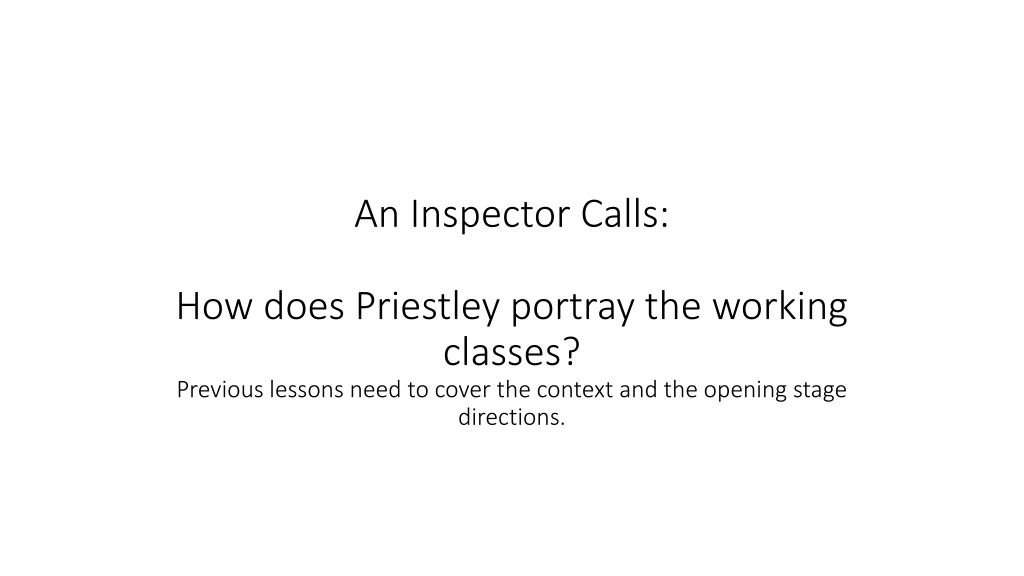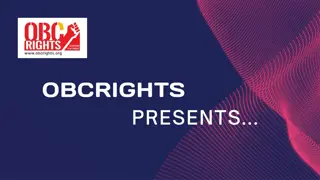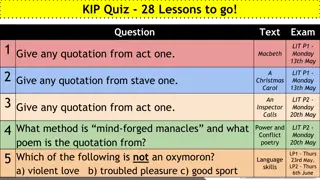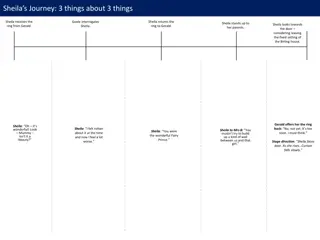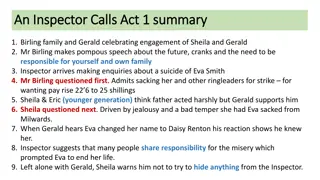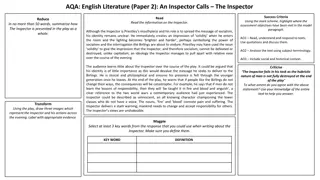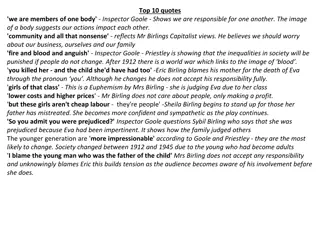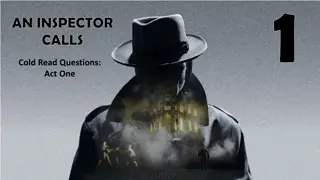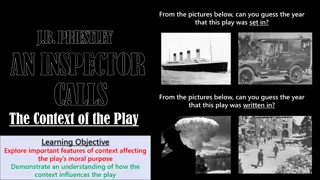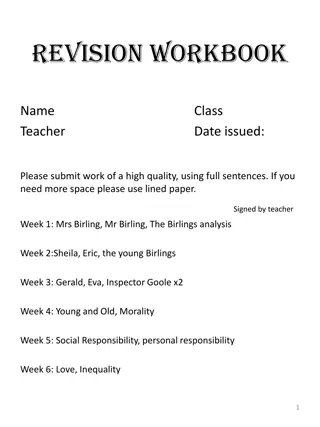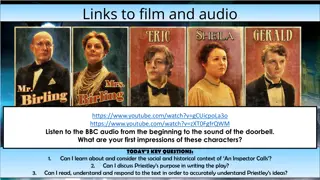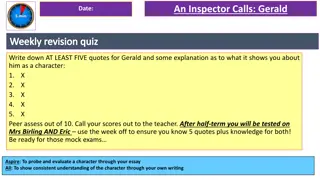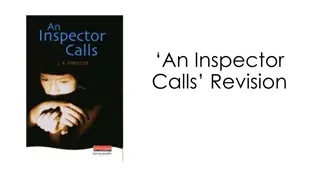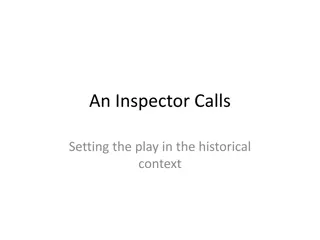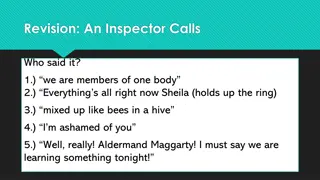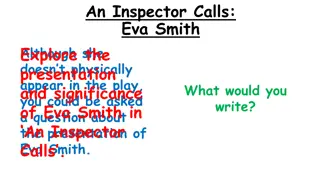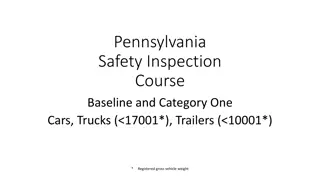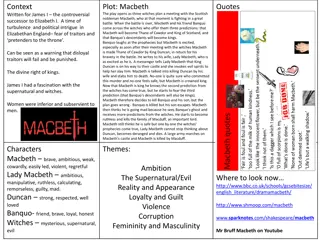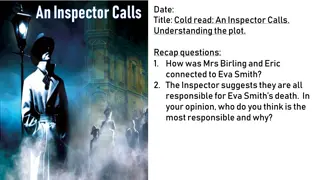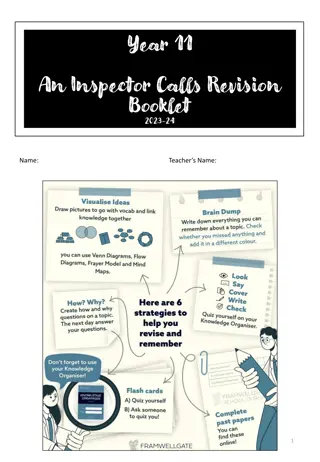Understanding Class Dynamics in "An Inspector Calls
Priestley portrays the working classes in "An Inspector Calls" by highlighting their struggles and the impact of societal inequalities. Through exploring the opening stage directions and dialogue, students can analyze the criticism of capitalism and individualism in the play. The discussion points delve into character interactions and power dynamics, shedding light on class distinctions and social critique.
Download Presentation

Please find below an Image/Link to download the presentation.
The content on the website is provided AS IS for your information and personal use only. It may not be sold, licensed, or shared on other websites without obtaining consent from the author. Download presentation by click this link. If you encounter any issues during the download, it is possible that the publisher has removed the file from their server.
E N D
Presentation Transcript
An Inspector Calls: How does Priestley portray the working classes? Previous lessons need to cover the context and the opening stage directions.
Knowledge Retrieval: Opening Stage Directions 1. In what year is the play set? 2. List 3 words to describe the family s dining room. 3. Where is Eric sitting as the curtain rises? 4. Finish the quotation: Mrs Birling is a rather cold woman and her husband s . 5. Eric is half shy, half assertive . What does assertive mean?
Todays aim: We are going to explore the play s opening dialogue. As we do this, we will consider how Priestley criticises capitalism and individualism. Explain these words to your partner
Discussion point 1: What do you notice about the balance of lines in this scene? Who speaks the most? Who speaks the least? Why might that be? Birling: Giving us the port, Edna? That s right. (He pushes it towards Eric.) You ought to like this port, Gerald, as a matter of fact, Finchley told me it's exactly the same port your father gets from him. Gerald: Then it'll be all right. The governor prides himself on being a good judge of port. I don t pretend to know much about it. Sheila: (gaily, possessively) I should jolly well think not, Gerald, I'd hate you to know all about port like one of these purple- faced old men. Birling: Here, I m not a purple-faced old man. Sheila: No, not yet. But then you don't know all about port do you? Birling: (noticing that his wife has not taken any) Now then, Sybil, you must a take a little tonight. Special occasion, y'know, eh? Sheila: Yes, go on, mummy. You must drink our health. Mrs Birling: (smiling) Very well, then. Just a little, thank you. (To Edna, who is about to go, with tray.) All right, Edna. I'll ring from the drawing room when we want coffee. Probably in about half an hour. Edna: (going) Yes, ma'am. Edna goes out. They now have all the glasses filled. Birling beams at them and clearly relaxes.
Discussion point 2: What do you notice about how the Birlings interact with Edna? What are the differences in how she replies to them? Why might this be? Birling: Giving us the port, Edna? That s right. (He pushes it towards Eric.) You ought to like this port, Gerald, as a matter of fact, Finchley told me it's exactly the same port your father gets from him. Gerald: Then it'll be all right. The governor prides himself on being a good judge of port. I don t pretend to know much about it. Sheila: (gaily, possessively) I should jolly well think not, Gerald, I'd hate you to know all about port like one of these purple- faced old men. Birling: Here, I m not a purple-faced old man. Sheila: No, not yet. But then you don't know all about port do you? Birling: (noticing that his wife has not taken any) Now then, Sybil, you must a take a little tonight. Special occasion, y'know, eh? Sheila: Yes, go on, mummy. You must drink our health. Mrs Birling: (smiling) Very well, then. Just a little, thank you. (To Edna, who is about to go, with tray.) All right, Edna. I'll ring from the drawing room when we want coffee. Probably in about half an hour. Edna: (going) Yes, ma'am. Edna goes out. They now have all the glasses filled. Birling beams at them and clearly relaxes.
Now read the whole extract. Birling: Giving us the port, Edna? That s right. (He pushes it towards Eric.) You ought to like this port, Gerald, as a matter of fact, Finchley told me it's exactly the same port your father gets from him. Gerald: Then it'll be all right. The governor prides himself on being a good judge of port. I don t pretend to know much about it. Sheila: (gaily, possessively) I should jolly well think not, Gerald, I'd hate you to know all about port like one of these purple- faced old men. Birling: Here, I m not a purple-faced old man. Sheila: No, not yet. But then you don't know all about port do you? Birling: (noticing that his wife has not taken any) Now then, Sybil, you must a take a little tonight. Special occasion, y'know, eh? Sheila: Yes, go on, mummy. You must drink our health. Mrs Birling: (smiling) Very well, then. Just a little, thank you. (To Edna, who is about to go, with tray.) All right, Edna. I'll ring from the drawing room when we want coffee. Probably in about half an hour. Edna: (going) Yes, ma'am. Edna goes out. They now have all the glasses filled. Birling beams at them and clearly relaxes.
Having read the extract, how would you describe the relationships between the characters? Write each answer as a full sentence. Include a because/but/so in each sentence. 1. Birling Mrs Birling 2. Birling Gerald 3. Birling Sheila 4. Birling Edna?
Staging the scene You are the director of the play, and want to work on presenting the relationships between the family and Edna, their servant. Write specific directions for your actors about how they are to speak and move on the stage. Line Directions (consider tone of voice, character position, movements, facial expression, body language ) Birling: Giving us the port, Edna? That s right. (He pushes it towards Eric.) You ought to like this port, Gerald, as a matter of fact, Finchley told me it's exactly the same port your father gets from him. Mrs Birling: (smiling) Very well, then. Just a little, thank you. (To Edna, who is about to go, with tray.) All right, Edna. I'll ring from the drawing room when we want coffee. Probably in about half an hour. Edna: (going) Yes, ma'am. Edna goes out. They now have all the glasses filled. Birling beams at them and clearly relaxes.
Watch the opening scene do your directions match the choices this director made? An Inspector Calls - YouTube
Todays aim: We are going to explore the play s opening dialogue. As we do this, we will consider how Priestley criticises capitalism and individualism. 1. What is the Birlings attitude towards Edna? 2. Where do you see this in the scene? 3. How do you feel about the Birlings treatment of Edna? 4. Why do you think Edna does not speak much in this scene? 5. How does this link to Priestley s message about capitalism and individualism?
Staging the scene You are the director of the play, and want to work on presenting the relationships between the family and Edna, their servant. Write specific directions for your actors about how they are to speak and move on the stage. Line Directions (consider tone of voice, character position, movements, facial expression, body language ) Birling: Giving us the port, Edna? That s right. (He pushes it towards Eric.) You ought to like this port, Gerald, as a matter of fact, Finchley told me it's exactly the same port your father gets from him. Tone of voice Body language and position Facial expression Movements Mrs Birling: (smiling) Very well, then. Just a little, thank you. (To Edna, who is about to go, with tray.) All right, Edna. I'll ring from the drawing room when we want coffee. Probably in about half an hour. Tone of voice Body language and position Facial expression Movements Edna: (going) Yes, ma'am. Tone of voice Body language and position Facial expression Movements Edna goes out. They now have all the glasses filled. Birling beams at them and clearly relaxes. Tone of voice Body language and position Facial expression Movements
